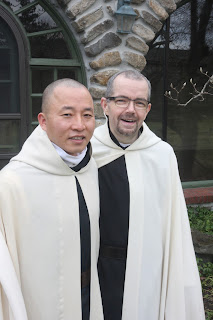In 1941 W.
H. Auden wrote “For the Time Being: A
Christmas Oratorio.” The poem is a series of dramatic monologues spoken by
characters in the biblical Christmas story along with choruses and a narrator.
The characters all speak in modern diction, and the events of the story are
portrayed as if they occurred in the
contemporary world. Simeon’s meditation in the poem in part goes as
follows: “And because of His visitation, we may no longer desire God as if He were lacking; our redemption
is no longer a question of pursuit but of surrender to Him who is always and
everywhere present. Therefore, at every moment we pray that, following Him, we
may depart from our anxiety into His peace.”
There really is no such thing as
“as if” when it comes to what we are celebrating on this night. Emmanuel, God
with us, is really and truly with us tonight, today in our lives. Christian
reflection through the centuries always comes to Simeon’s conclusion- the
birth of Christ, “His visitation,” changes the entire human agenda, changes it
from pursuing a missing, an absent God to surrendering to an “always and
everywhere present God.”
The
Incarnation, God becoming human, is really a landmark, cosmic, ontological shift which changes everything. When God was
missing (or presumed missing) we could always ask questions
like, “Where is God in all this anyway?” with its presumed answer of “nowhere.”
Or we could scream out, often hysterically, “How long, O Lord, how long?” to
some distant, remote deity. After all one can always deny or scream at or
blame a distant, missing god (who may or may not really be there anyway). But
if God is “always and everywhere present,” what then?
Brothers
and sisters, this is what we’re all about tonight- learning to continue to surrender to our
“always and everywhere present God.” And this year that always and everywhere
includes Friday, Decmber 14, 2012 in Newtown, Connecticut. That was the day that I began to
reflect and put together my thoughts for this homily. I was doing just that
when I received the news of that tragic event. To be honest, I couldn’t
continue. Whatever I was thinking and trying to say, seemed so meaningless at
that moment. So, I went for walk. The following day when I returned to my
reflections on today’s Feast, it was still a struggle for me. I found myself
wanting to avoid this horrendous tragedy; to put it out of my mind and get on
with my Christmas homily. But would it really be a Christmas homily if I
bracketed all the very real human tragedies in our world today?
We who
worship Jesus on this holy night, we who listen again to the song which the
angels sang, we who begin to glimpse the reality that in
Jesus heaven and earth really do come together, we now have the responsibility
to sing this song for ourselves, and so to discover what it might look like in
practice for Jesus really to be the Savior, the King, the Lord in this so sad,
and often tragic world of ours. The Christmas message is about the reality of
God becoming flesh- part and parcel of our reality, with all the suffering and
puzzlement that goes with it.
I just
mentioned that on first hearing of the tragedy in Newtown I tried to avoid it,
so I could get on with my Christmas homily. What I came to realize was that it
was right there in the midst of all that pain and heartache that God was being
born. And I pray to God that in saying this I am not putting some "theological
veneer" over the whole painful, tragic mess. A Jewish rabbi ,who was present in
the fire house where family members were gathering in the midst of the chaos of
that day, was interviewed by a reporter. He said the following: “There’s no
theological answer to this. What you have to do is be with them, hug them and
cry with them.” Isn’t that why God became human, so that He could be with us, embrace us and cry
with us? The images that I saw in newspapers or on the internet of so many
people doing just that, embracing and crying with each other, became for me a
sort of living icon of God’s Incarnation. And I am more convinced now than I
was before December 14, that because of God’s Incarnation God’s
embrace is wider, broader, deeper than any evil. And God’s tears can quench the
flames of any hell.
And so
brothers and sisters, let us praise this Jesus tonight from a full heart, full
with all that we carry within it, and from a glad heart. And let us celebrate
His birth with everything we’ve got. And then in our own unique ways, big and
small, let’s go and bring God’s glory in heaven to his people on earth. The
angels sang their song. And they did a pretty good job of it. Maybe it’s time
we learned to sing it back to them.
Excerpts from Abbot Damian's Homily for this year's Christmas Mid-night Mass. Photograph of a detail of the Abbey Creche taken by Brother Jonah.









.jpg)
















